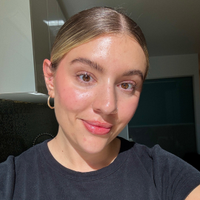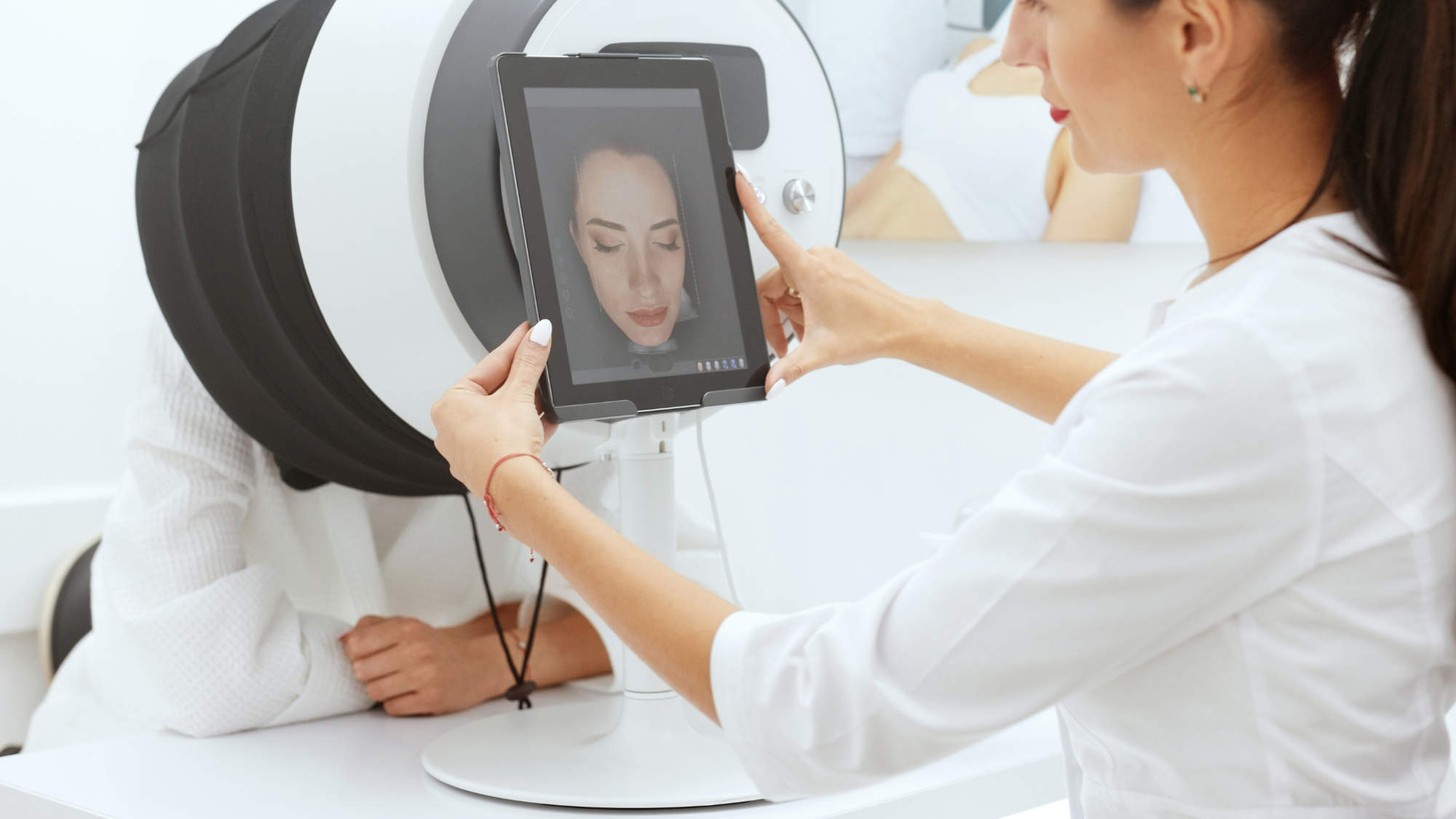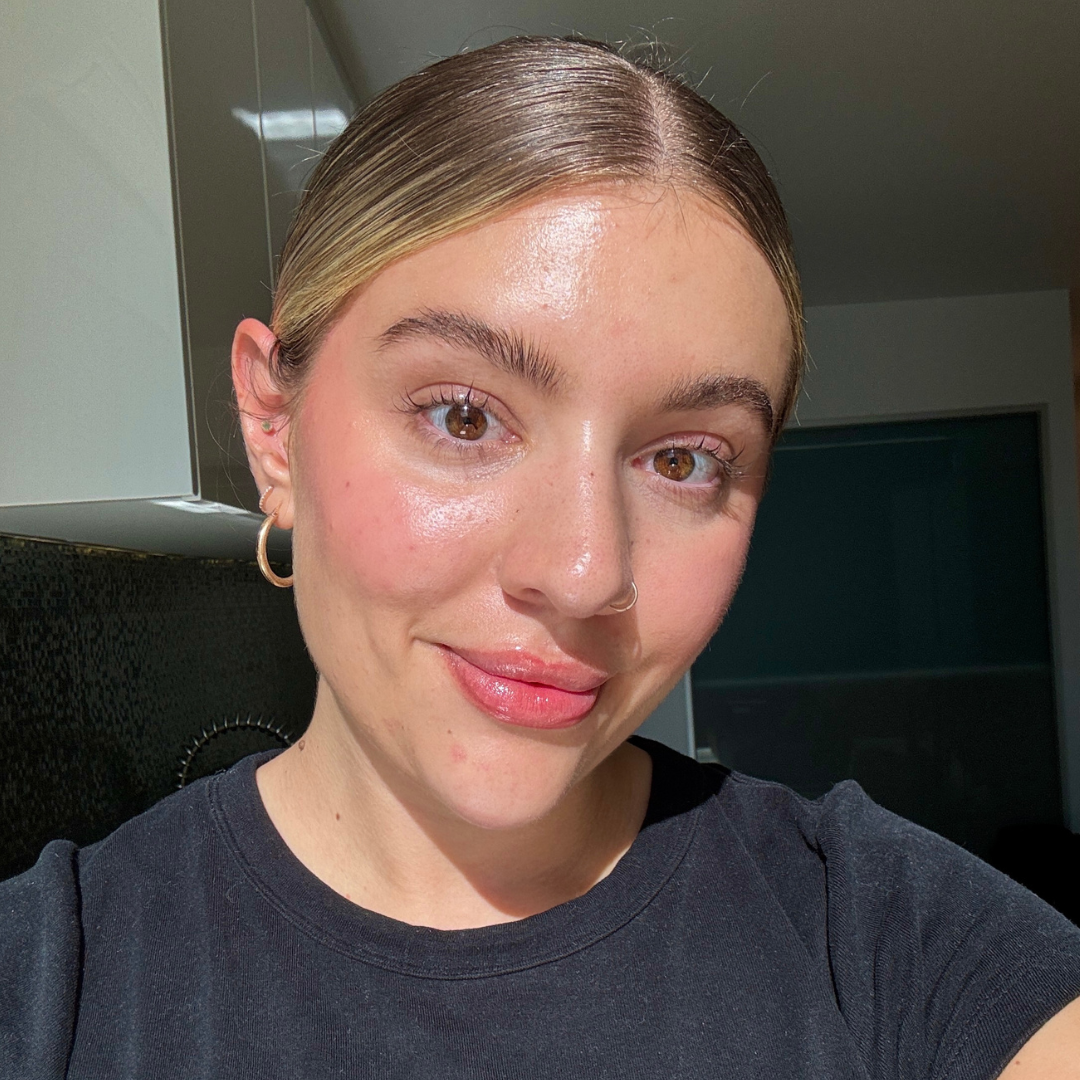On a budget but need help with your skin? Here’s how AI can act as your personal dermatologist
Innovations galore


Celebrity news, beauty, fashion advice, and fascinating features, delivered straight to your inbox!
You are now subscribed
Your newsletter sign-up was successful
It's hard to deny that AI is coming for almost every part of modern life. And while that may scare some, it can be exciting, particularly if you're looking to save money but still have access to the best beauty services. Case in point: the way artificial intelligence has evolved in skincare and dermatology. Below, we unpack how AI is already influencing how we approach our skin concerns.
How is AI influencing dermatology?
Developments in artificial intelligence have started to benefit skin both aesthetically and medically, meaning the look and health of your skin can reap rewards on a superficial level, as well as more deeply.
"There have been a number of strides in recent years when it comes to AI, skincare and dermatology," says Dr Alexis Granite, consultant dermatologist & founder of Joonbyrd. "This includes personalised skincare algorithms, diagnostic programs for skin types as well as mole mapping, virtual makeup try-ons and ingredient databases. AI is also being used within the industry to help discover new ingredients and identify customer preferences and trends."
One of the most notable examples of AI working its way into consumer skincare was the 2024 launch of The Inkey List's Acne Analyser PRO, which offers dermatology-style assessments for the masses.
"Our Acne Analyser PRO is a next-generation digital skin scanner that is powered by seamlessly integrating an optimal combination of Artificial Intelligence and medical expert-backed human understanding," explains co-founder Colette Laxton. "It offers hyper-personalised analysis for acne and breakout-prone skin, allowing people to understand their skin better, creating an in-depth skin analysis report and providing a personalised routine to be able to treat it."
The tool works by taking photos of your face and then scanning each area to assess breakouts, figuring out which areas are at most risk, what may be causing the blemishes, and the kind of acne you may be experiencing. Using this information, it then creates a bespoke routine for your skin. And it does all this in just three minutes. "During the experience, the tool accesses a powerful, live back-end acne matrix that builds a custom routine in real-time that is based on the individual’s personal skin data and needs. Instead of pre-set product routines, the acne matrix means there are hundreds of possible product combinations, resulting in true personalisation," she continues.
A post shared by Dr Kemi Fabusiwa (@dr.fab)
A photo posted by on
And then, medically speaking, AI is making strides when it comes to mole mapping and skin cancer detection. This, in theory, makes it far easier to have your skin checked and to be alerted to any abnormalities, without needing to visit a skin specialist in person, at least initially; though this is always advised.
Celebrity news, beauty, fashion advice, and fascinating features, delivered straight to your inbox!
It's the Skin Analytics AI tool 'DERM' that has the potential to change how we go for skin check-ups. As we know, it's so important to have moles or skin lesions regularly checked, but with the length of NHS waiting lists and the soaring costs of private medical insurance, it's not always easy to get help when we need it. The DERM tool, however, which has been used by NHS doctors, has recently been granted regulatory approval to detect skin cancers using AI alone, meaning independent use may be increasingly common.
The tool, which scans lesions and moles and can detect the risk of skin cancers, is already available for BUPA and Vitality customers. It is also offered for free at 21 NHS sites, which can be visited independently. The goal is for it to eventually become available on our smartphones, meaning we can even use it from home. It's a pretty pivotal moment in the medical world, and one that has been deemed highly reliable despite using AI analysis alone, without a physical doctor.
A post shared by The INKEY List (@theinkeylist)
A photo posted by on
While there are obvious major benefits to these exciting and even groundbreaking advances, it's important to take a balanced approach in our use of AI as it stands, particularly when it comes to our health. Yes, tools such as DERM should have a place (particularly considering the current struggles of our healthcare system), but that doesn't mean that in-person skin experts should be forgotten or undermined.
Consultant dermatologist Dr Ajoy Bardhan comments that AI skin cancer tools definitely "have potential to help filter out lesions that are not obviously cancerous to reassure people, and perhaps reduce the number of people seeking face-to-face appointments with consultants who are in short supply." However, he adds: "these technologies do remain very much in development and the threshold for cancer detection can vary, depending on how the software is set up."
For example, he points to AI's current inability to do whole body checks: "One mole may be excluded as non-cancerous, but a human dermatologist might spot something else that the AI hasn't photographed, which could be much more important. There are also subtle signs that a consultant dermatologist will be trained to detect, including how a particular mole looks as compared to the other moles an individual may display, as well as considering risk factors for skin cancer development."
He concludes that AI tools do not replace consultant dermatologists, and cannot be considered a like-for-like replacement. "Ultimately, seeing a real-life doctor will offer not just an empathetic human interaction, but will also offer comprehensive assessment and care, as well as being responsible for the treatment of the skin lesion—AI doesn't yet know how to do that."
Similarly, when it comes to devices that help to treat forms of acne or other skin concerns, you can use AI tools at home as a first step, but it is no replacement for an IRL dermatologist. "These types of tools are good for analysing straightforward skin concerns and starting skincare routines," explains Dr Granite.
"For more complex skin issues such as cystic acne, rosacea, eczema and psoriasis, it’s important to recognise the limitations of AI and over-the-counter skincare." For this reason, if you don't see any improvements after your learnings from certain AI tools, it may be time to book in to see an IRL derm for further care."
A post shared by SmartSKN Labs (@smartsknlabs)
A photo posted by on
How you can use AI to your advantage
As mentioned, it's important to see AI's dermatology advances for what they are: a first step in what may be a longer journey. For those seeking an accessible option to understand their breakouts, for example, trying something like The Inkey List's Acne Analyser PRO offers a free, easy-to-use approach to improving your skin. For random breakouts and the odd bout of redness or pigmentation, these tools can be a real game-changer. However, it's important to know when to seek in-person care with a skin expert. If your condition is not improving or you're experiencing consistent acne or other more severe problems, a dermatologist is likely your best bet.
Similarly, as software such as DERM continues to evolve and become more accessible, we should absolutely take advantage of these advances. Have a single mole or lesion you are concerned about? If you have access to the device at an NHS location near you, this tool can help you determine if you need to take it further and book a doctor's appointment. But if a mole or lesion has changed, is new, you're very worried, or you don't want to rely entirely on artificial intelligence (which is completely understandable), this is the time to go directly to the doctor. Similarly, all-over body scans you can have in person are essential for detecting skin cancers early.
Utilising AI in your own skin journey really comes down to curiosity and common sense; depending on your condition and concern, you can make a judgement call on whether you should experiment with these tools first, or skip them and go straight to your GP or derm. Either way, be sure to always have areas of concern checked out.
For more information on checking your moles and lesions, take a look at the NHS's guide to moles and detecting melanoma.

Rebecca is a freelance beauty journalist and contributor to Marie Claire. She has written for titles including Refinery29, The Independent, Grazia, Coveteur, Dazed, Stylist, and Glamour. She is also a brand consultant and has worked with the likes of The Inkey List on campaign messaging and branded copy. She’s obsessed with skincare, nail art and fragrance, and outside of beauty, Rebecca likes to travel, watch true crime docs, pet sausage dogs and drink coffee. Rebecca is also passionate about American politics and mental health awareness.